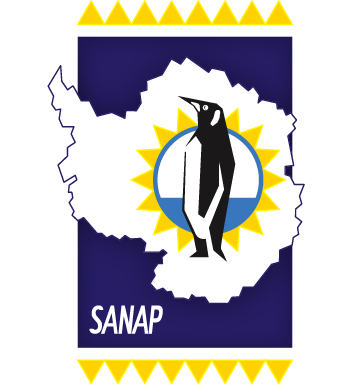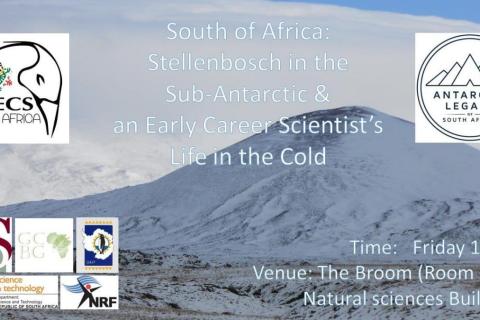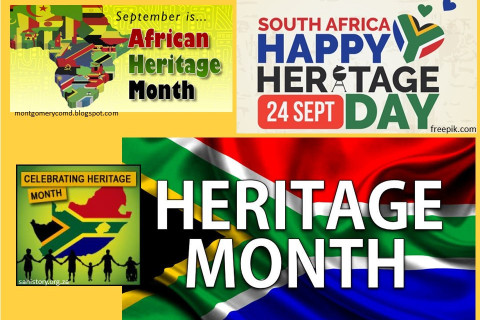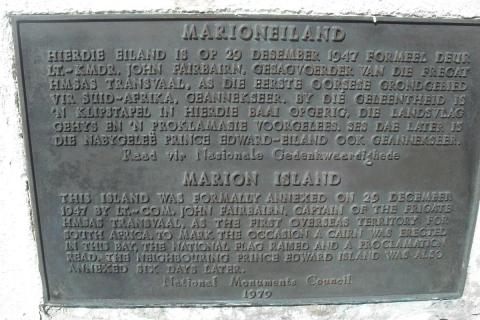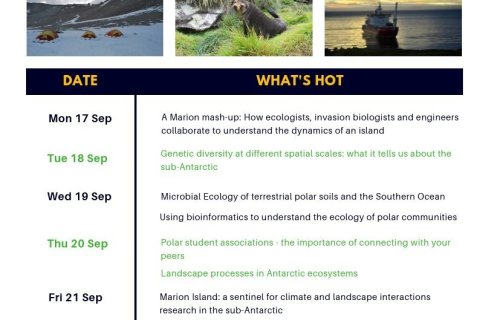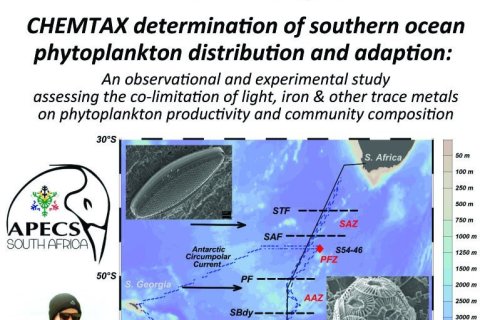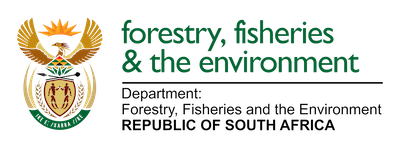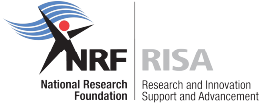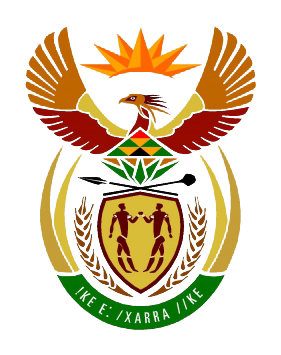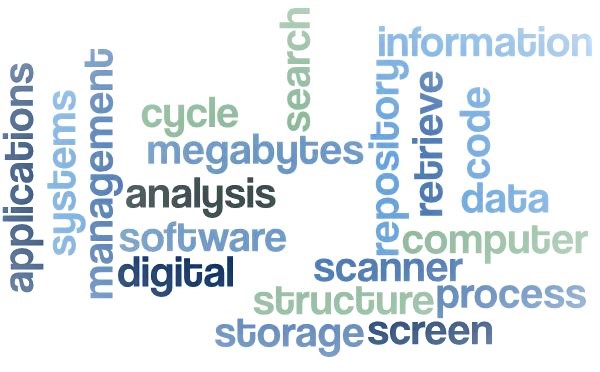
by Ria Olivier | Apr 2, 2020 | Announcement, Research, SCAR, Science
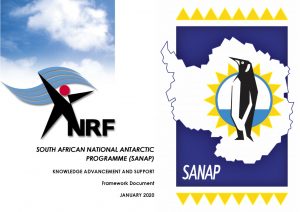 The Call for SANAP Proposal submission is 30 April. It is important that within the proposal principal investigators need to look at data management. Below information to help with the proposal.
The Call for SANAP Proposal submission is 30 April. It is important that within the proposal principal investigators need to look at data management. Below information to help with the proposal.
“The amount of time and money required for coding, checking, computerizing, and documenting the data is frequently underestimated in planning a study. Successful data management depends on a sound organization that has mapped out in advance all the data preparation, processing, and documentation steps and is ready to implement these steps when data collection is about to commence. In other words, the data management system should be fully operational before the project gets buried under an avalanche of incoming data that need to be coded, checked, and entered.” Data Collection and Analysis by M Stouthamer-Loeber & W van Kammen .
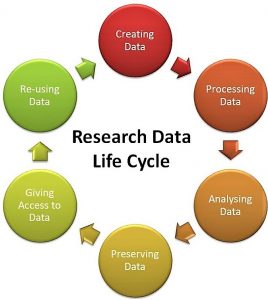 The Marine and Antarctic Research Strategy (2016) states that “Data transfer, access and reliability remain a challenge when working in this research sector. Proper centralized management of data emanating from the ocean, Antarctica and the Islands is required to meet both national and international data requirements. Systems that make the data available to national and international users are required. This would require appropriate management, so as to guarantee the integrity of the data. Obviously, reliable access to this data would also be critical.”
The Marine and Antarctic Research Strategy (2016) states that “Data transfer, access and reliability remain a challenge when working in this research sector. Proper centralized management of data emanating from the ocean, Antarctica and the Islands is required to meet both national and international data requirements. Systems that make the data available to national and international users are required. This would require appropriate management, so as to guarantee the integrity of the data. Obviously, reliable access to this data would also be critical.”
The South African Antarctic and Southern Ocean Research Plan. 2014-2024 highlights data dynamics within SANAP. “Data transfer, access and reliability remain a challenge when working in the region. Proper centralized management of data emanating from the Southern Ocean and Antarctic is required, to meet both national and international data requirements. Systems that make the data available to national and international users are required. This would require appropriate management, so as to guarantee the integrity of the data. Obviously, reliable access to this data would also be critical.”
 Scientific Committee on Antarctic Data Management. “Data and information are valuable and irreplaceable resources. Proper management of data and information is not an “add-on” or an additional task; it is a fundamental aspect of modern science”.
Scientific Committee on Antarctic Data Management. “Data and information are valuable and irreplaceable resources. Proper management of data and information is not an “add-on” or an additional task; it is a fundamental aspect of modern science”.
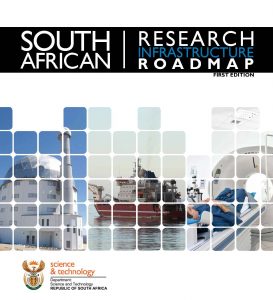 From the Department of Science and Innovation: “To complement the focus on global infrastructure in South Africa, a South African Research Infrastructure Roadmap (SARIR) has been developed to facilitate a research infrastructure investment programme. At the very least, information and communication technologies and data management services will be a fundamental part of every type of research infrastructure. Data-driven science implies that many of the research teams will base their scientific activity on the processing of collected data and remote access. Data management services are therefore essential to ensure the competitiveness of research groups.”
From the Department of Science and Innovation: “To complement the focus on global infrastructure in South Africa, a South African Research Infrastructure Roadmap (SARIR) has been developed to facilitate a research infrastructure investment programme. At the very least, information and communication technologies and data management services will be a fundamental part of every type of research infrastructure. Data-driven science implies that many of the research teams will base their scientific activity on the processing of collected data and remote access. Data management services are therefore essential to ensure the competitiveness of research groups.”
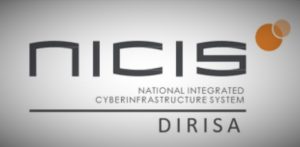 NICIS And DIRISA Function within the department of Science and Innovation. The Data Intensive Research Initiative of South Africa(DIRISA) forms part of the National Integrated Cyber Infrastructure System(NICIS). DIRISA aims to Implement a Certified
NICIS And DIRISA Function within the department of Science and Innovation. The Data Intensive Research Initiative of South Africa(DIRISA) forms part of the National Integrated Cyber Infrastructure System(NICIS). DIRISA aims to Implement a Certified Trusted Repository for research data and to operationally deploy and maintain data services and virtual research environments. They aim to initiate the establishment of federated data repositories. DIRISA is required to formulate national strategic frameworks for data intensive research and data stewardship
Trusted Repository for research data and to operationally deploy and maintain data services and virtual research environments. They aim to initiate the establishment of federated data repositories. DIRISA is required to formulate national strategic frameworks for data intensive research and data stewardship
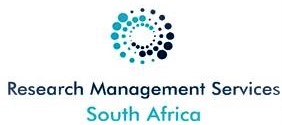 The Research Management Services of South Africa provide support for qualitative Data Analysis. Qualitative data analysis for empirical and theoretical data for students and staff using ATLAS.ti. They offer analysis for any research project that includes code qualitative data, categorise data, provide thematic reports and offer advice on how to interpret these themes by invoking the theory/literature. (Contact info@rms-sa.org)
The Research Management Services of South Africa provide support for qualitative Data Analysis. Qualitative data analysis for empirical and theoretical data for students and staff using ATLAS.ti. They offer analysis for any research project that includes code qualitative data, categorise data, provide thematic reports and offer advice on how to interpret these themes by invoking the theory/literature. (Contact info@rms-sa.org)
Research Data Alliance announce that with the recent cancellation of Plenary 15 in Melbourne, Australia, the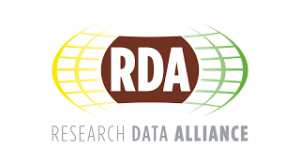 local organising committee, RDA Technical Advisory Board and RDA Secretariat the RDA Virtual Plenary 15 (VP 15), taking place 18 March – 10 April 2020. VP 15 will offer remote access to many of the sessions that were planned to take place in Melbourne.
local organising committee, RDA Technical Advisory Board and RDA Secretariat the RDA Virtual Plenary 15 (VP 15), taking place 18 March – 10 April 2020. VP 15 will offer remote access to many of the sessions that were planned to take place in Melbourne.
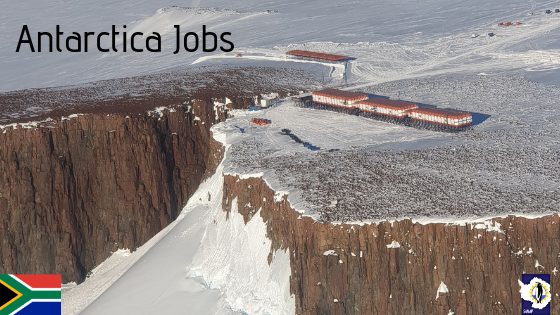
by Fishgate@sanap | Jul 2, 2019 | Announcement, Antarctica, Jobs, News, Overwintering Team, SANAE
Apply now to be part of the 59th South African National Antarctic Expedition (SANAE) overwintering team!
Positions available:
| Job Title | Station | Period | Closing Date | Download Job Advert |
| SANSA Volunteer Positions (x3) VIDEO | Antarctica - SANAE IV | December 2019 - February 2020 | 25 September 2019 | More info, click here! |
Senior Meteorological Technician
VIDEO | Antarctica - SANAE IV | December
2019 to January 2021 | Closed
| More info, click here! |
Communications/Electronics Engineer
VIDEO | Antarctica - SANAE IV | December
2019 to January 2021 | Closed | More info, click here! |
| Mechanical Engineer | Antarctica - SANAE IV | December
2019 to January 2021 | Closed | More info, click here! |
Electrical Engineer/Technician
VIDEO | Antarctica - SANAE IV | December
2019 to January 2021 | Closed | More info, click here! |
Diesel Mechanic
VIDEO | Antarctica - SANAE IV | December
2019 to January 2021 | Closed | More info, click here! |
Medical Doctor
VIDEO | Antarctica - SANAE IV | December
2019 to January 2021 | Closed | More info, click here! |
| RADAR Engineer - South African National Space Agency | Antarctica - SANAE IV | December
2019 to January 2021 | Closed | |
| VLF Engineer - South African National Space Agency | Antarctica - SANAE IV | December
2019 to January 2021 | Closed | |
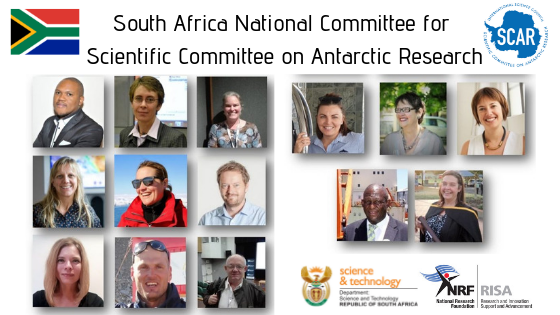
by Fishgate@sanap | Mar 14, 2019 | Announcement, Antarctica, Marion Island, News, Research, SANAP, Science, Southern Ocean
South Africa has been involved in Antarctic research since the geophysical year of 1957. The first 10 years of South Africa’s science and research in the Antarctic is highlighted in an article by DG Kingwell, at that stage the secretary of the South African Scientific Committee for Antarctic Research (SASCAR).
The Antarctic Research of South Africa is part of The International Science Council (ISC), South Africa.
South Africa is a national member of ISC through the National Research Foundation (NRF) and the Human Sciences Research Council (HSRC) supported by the Department of Science and Technology (DST). The South African ISC -Secretariat serves the scientific community and the ISC scientific unions and affiliates to which South Africa adheres. The SA ISC Secretariat provides support and organisational services for the ISC National Board of SA, and to the SA ISC National Committees to advance South Africa’s position in international platforms. The total membership of these committees is in excess of 200 scientists. Approximately 100 South Africans serve on ICS-related commissions and working groups. The ISC activities in South Africa are focused on the following principals:
- Science-for-policy: Stimulate and support national and international scientific research and scholarship, and to communicate science that is relevant to national and international policy issues;
- Policy-for-science: Promote developments that enable science to contribute more effectively to major issues in the national and international public domain;
- Science-for-society: Stimulate science engagement with society;
- Scientific freedom and responsibility: Support the free and responsible practice of science;
- Adherence: Support committees through payment of ISC membership dues.
South Africa Science and Research is also part of the Scientific Committee on Antarctic Research (SCAR) where the committee members will represent South Africa at SCAR meetings.
The new National Committee has been announced in a letter by Tracy Klarenbeek – Professional Officer, Knowledge Advancement and Support (KAS) and their first meeting took place at Stellenbosch University on 6 March 2019.
Dear SANAP Community,
It gives me great pleasure in sharing the names of the individuals selected to represent us all at SCAR. Of course, these individuals will rely heavily on inputs from the entire community, so I sincerely hope that you will be available to support them in their endeavours. Members of the community that are not an the steering committee are still strongly encouraged to participate in SCAR and SCAR-related activities. The DST and the NRF are planning a follow-up meeting with the whole community, hopefully by the middle of the year (academic and other schedules permitting), so as to give feedback on a number of initiatives ongoing that will possibly impact on us all, including plans for current and future SA participation in SCAR. We look forward to seeing you there.
The final list is below, the details of which will be communicated to SCAR in due course. Professor Bettine van Vuuren was nominated as the Committee Chair, Tracy Klarenbeek as Vice-Chair and Dr Gilbert Siko representing the Department of Science and technology.
Life Sciences Standing Committee of SCAR
- Thulani Makhalanyane (South African Representative)
- Bettine van Vuuren
- Anne Treasure

Physical Sciences Standing Committee of SCAR
- Sandy Thomalla
- Sarah Fawcett (South African Representative)
- Stefan Lotz

Geosciences Standing Committee of SCAR
- Christel Hansen
- Werner Nel
- Geoff Grantham (South African Representative)

Social Sciences and Humanities Standing Committee of SCAR
- Anché Louw
- Ria Olivier (South African Representative)
- Charne Lavery

Please give this committee your support in their efforts to take South African science to the world via SCAR.
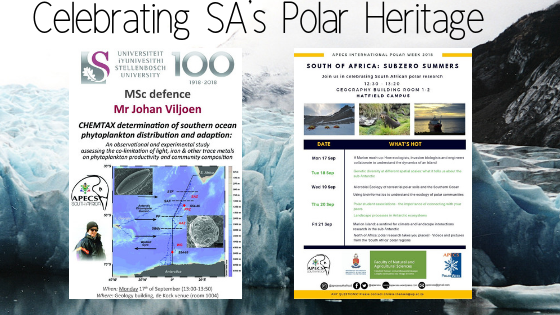
by Fishgate@sanap | Sep 14, 2018 | Announcement, Important Dates, Legacy
As South Africans we celebrate our Heritage during the month of September. Also, during the second last week of September all over the globe researchers celebrate ‘International Polar Week’. In 2017 Antarctic Legacy of South Africa came up with a slogan to combine the two celebrations: “Celebrating South Africa’s Polar Heritage’.
This slogan is to remind all South Africans of our involvement in the Antarctic region since 1947/1948, when South Africa Annexed the sub-Antarctic Marion and Prince Edward Islands. In 1955 the first South African (Hannes la Grange) set foot on the Antarctic Continent and the foundation was laid for all future South African Antarctic expeditions. On 3 December 1959 South Africa’s first Antarctic overwintering team (South African National Antarctic Expedition – SANAE1) departed from Cape Town Harbour on the Polarbjørn.
This year South Africa’s Polar Heritage will be celebrated by four events (three organised and hosted by APECS South Africa and one event hosted by Iziko Museums of South Africa):
| Organiser | Event | Location | Date | More information
|
| APECS-SA | Talk: CHEMTAX determination of southern ocean phytoplankton distribution and adaptation. | Stellenbosch University, Geology Building, de Kock Venue (room 1004), 13:00 - 13:50 | 17 September | Click here |
| APECS-SA | Series of talks that involves the sub-Antarctic Marion Island and Antarctica. | University of Pretoria, Geography building, (Hatfield campus),
12:30-13:20 | 17 - 21 September | Click here |
| APECS-SA | Talk: Life on Marion Island and Stellenbosch's legacy in Antarctic research. | Stellenbosch University, Department of Botany and Zoology, Room 206 (The Broom), 13:00 - 14:00 | 21 September | Click here |
Iziko Museums of South Africa
(ALSA supplied material) | Antarctic related activities in the Marion Island Exhibition area (ground floor). | Iziko Museum - Cape Town | 24 September | Click here |
Why is ‘Polar Week’ celebrated in September (and also in March)?
“The equinoxes in September and March are the only time when everywhere on earth the day length is 12 hours, a perfect opportunity to celebrate the poles on a global scale!” (APECS – Association of Polar Early Career Scientists).
Click here to see where Antarctic Legacy of South Africa was in involved in 2017.
Author: Anche Louw (Antarctic Legacy of South Africa), 14 September 2018
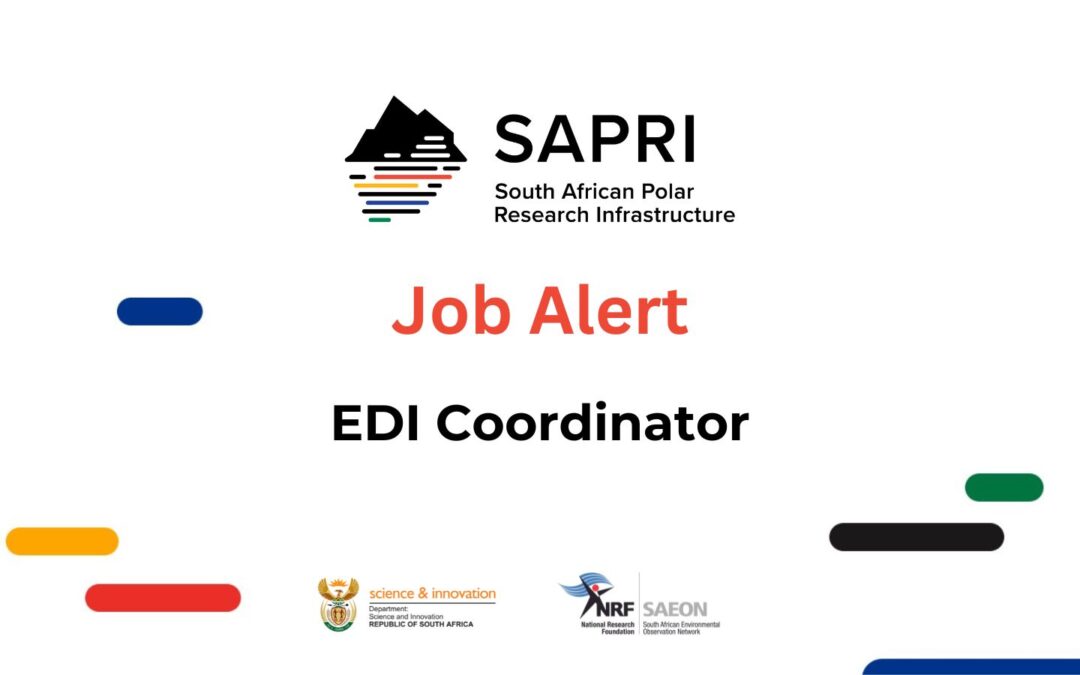
by Ria Olivier | Oct 26, 2023 | Announcement, Jobs, SA Polar Research Infrastructure, SAPolarRI, SAPRI
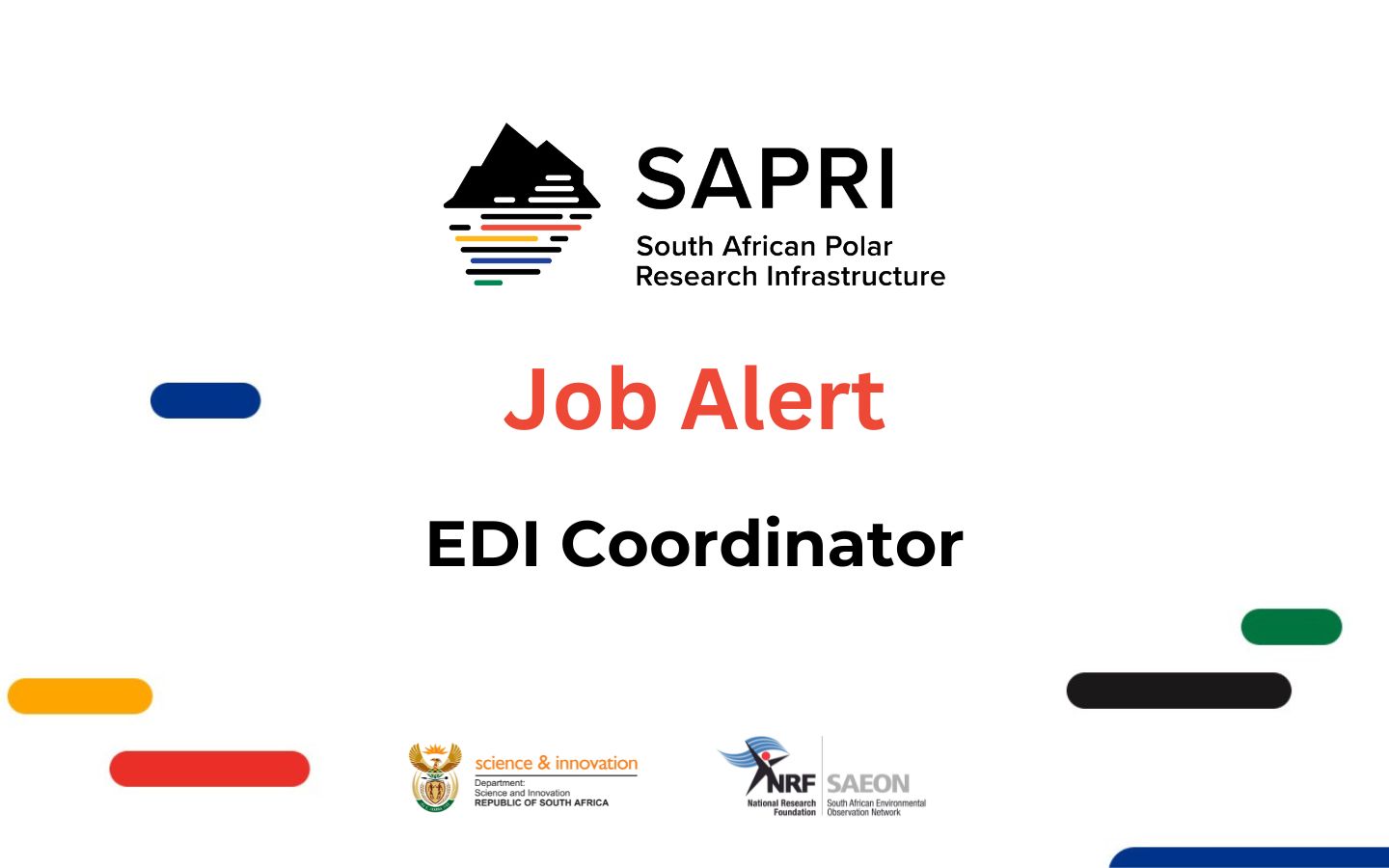
The South African Environmental Observation Network (SAEON), managed by the National Research Foundation (NRF) requires the services of an EDI Coordinator responsible for driving and supporting transformation in marine and polar sciences in South Africa, coordinating the South African Polar Research Infrastructure (SAPRI) Mentorship Programme, and compiling the SAPRI Code of Conduct (CoC).
As per job advertisement:
Key Responsibilities:
- Collaborate with NRF-SANAP, DFFE, DSI and other key stakeholders to understand past efforts and design a forward looking, phased approach to transforming marine and polar sciences
- Collaborate with historically disadvantaged institutes to promote marine and polar sciences
- Collaborate with previously disadvantaged individuals who are interested in marine and polar sciences
- Collaborate with current and past SANAP and MARS stakeholders to understand the blockages with regards to transformation
- Responsible for coordinating the design and implementation of the SAPRI mentorship programme, including all elements such as the needs to be addressed, programme length and structure, mentee and mentor recruitment, strategies for mentee-mentor matching, activities, addressing mentee and/or mentor challenges to participate (e.g. technological barriers, funding), etc.
- Organise and chair meetings of the mentorship programme organisational committee and ensure that minutes are recorded
- Design and implement a programme monitoring and evaluation strategy
- Report writing at the end of each iteration of the programme and work on strategies to ensure programme sustainability
- Compile the SAPRI Code of Conduct (CoC)
- Review existing SA polar / marine CoCs (e.g. SEAmester, etc)
- Form and chair a CoC Action Group
- Represent SAPRI and South African polar community on EDI committees (e.g. SCAR, SOOS, others) and give talks, presentations, webinars on EDI where relevant
- Organise workshops for SAPRI stakeholders and community to create awareness of EDI
Apply before: 08 November 2023
View the full job advert here:
EDI Coordinator at NRF National Research Foundation job in Foreshore, Western Cape | CareerJunction
Anche Louw, South African Polar Research Infrastructure, 26 October 2023

 The Call for SANAP Proposal submission is 30 April. It is important that within the proposal principal investigators need to look at data management. Below information to help with the proposal.
The Call for SANAP Proposal submission is 30 April. It is important that within the proposal principal investigators need to look at data management. Below information to help with the proposal. The Marine and Antarctic Research Strategy (2016) states that “Data transfer, access and reliability remain a challenge when working in this research sector. Proper centralized management of data emanating from the ocean, Antarctica and the Islands is required to meet both national and international data requirements. Systems that make the data available to national and international users are required. This would require appropriate management, so as to guarantee the integrity of the data. Obviously, reliable access to this data would also be critical.”
The Marine and Antarctic Research Strategy (2016) states that “Data transfer, access and reliability remain a challenge when working in this research sector. Proper centralized management of data emanating from the ocean, Antarctica and the Islands is required to meet both national and international data requirements. Systems that make the data available to national and international users are required. This would require appropriate management, so as to guarantee the integrity of the data. Obviously, reliable access to this data would also be critical.” Scientific Committee on Antarctic Data Management. “Data and information are valuable and irreplaceable resources. Proper management of data and information is not an “add-on” or an additional task; it is a fundamental aspect of modern science”.
Scientific Committee on Antarctic Data Management. “Data and information are valuable and irreplaceable resources. Proper management of data and information is not an “add-on” or an additional task; it is a fundamental aspect of modern science”. From the Department of Science and Innovation: “To complement the focus on global infrastructure in South Africa, a South African Research Infrastructure Roadmap (SARIR) has been developed to facilitate a research infrastructure investment programme. At the very least, information and communication technologies and data management services will be a fundamental part of every type of research infrastructure. Data-driven science implies that many of the research teams will base their scientific activity on the processing of collected data and remote access. Data management services are therefore essential to ensure the competitiveness of research groups.”
From the Department of Science and Innovation: “To complement the focus on global infrastructure in South Africa, a South African Research Infrastructure Roadmap (SARIR) has been developed to facilitate a research infrastructure investment programme. At the very least, information and communication technologies and data management services will be a fundamental part of every type of research infrastructure. Data-driven science implies that many of the research teams will base their scientific activity on the processing of collected data and remote access. Data management services are therefore essential to ensure the competitiveness of research groups.” NICIS And DIRISA Function within the department of Science and Innovation. The Data Intensive Research Initiative of South Africa(DIRISA) forms part of the National Integrated Cyber Infrastructure System(NICIS). DIRISA aims to Implement a Certified
NICIS And DIRISA Function within the department of Science and Innovation. The Data Intensive Research Initiative of South Africa(DIRISA) forms part of the National Integrated Cyber Infrastructure System(NICIS). DIRISA aims to Implement a Certified Trusted Repository for research data and to operationally deploy and maintain data services and virtual research environments. They aim to initiate the establishment of federated data repositories. DIRISA is required to formulate national strategic frameworks for data intensive research and data stewardship
Trusted Repository for research data and to operationally deploy and maintain data services and virtual research environments. They aim to initiate the establishment of federated data repositories. DIRISA is required to formulate national strategic frameworks for data intensive research and data stewardship![]() The Research Management Services of South Africa provide support for qualitative Data Analysis. Qualitative data analysis for empirical and theoretical data for students and staff using ATLAS.ti. They offer analysis for any research project that includes code qualitative data, categorise data, provide thematic reports and offer advice on how to interpret these themes by invoking the theory/literature. (Contact info@rms-sa.org)
The Research Management Services of South Africa provide support for qualitative Data Analysis. Qualitative data analysis for empirical and theoretical data for students and staff using ATLAS.ti. They offer analysis for any research project that includes code qualitative data, categorise data, provide thematic reports and offer advice on how to interpret these themes by invoking the theory/literature. (Contact info@rms-sa.org) local organising committee, RDA Technical Advisory Board and RDA Secretariat the RDA Virtual Plenary 15 (VP 15), taking place 18 March – 10 April 2020. VP 15 will offer remote access to many of the sessions that were planned to take place in Melbourne.
local organising committee, RDA Technical Advisory Board and RDA Secretariat the RDA Virtual Plenary 15 (VP 15), taking place 18 March – 10 April 2020. VP 15 will offer remote access to many of the sessions that were planned to take place in Melbourne.